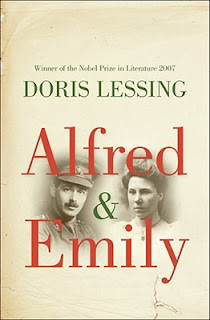Alfred & Emily
Summary (from the publisher): In this extraordinary book, the 2007 Nobel Laureate Doris Lessing explores the lives of her parents, each irrevocably damaged by the Great War. Her father wanted the simple life of an English farmer, but shrapnel almost killed him in the trenches, and thereafter he had to wear a wooden leg. Her mother, Emily, spent the war nursing the wounded in the Royal Free Hospital after her great love, a doctor, drowned in the Channel.
In the fictional first half of Alfred and Emily, Doris Lessing imagines the happier lives her parents might have made for themselves had there been no war; a story that begins with their meeting at a village cricket match outside Colchester. This is followed by a piercing examination of their relationship as it actually was in the shadow of the Great War, of the family's move to Africa, and of the impact of her parents' marriage on a young woman growing up in a strange land.
"Here I still am," says Doris Lessing, "trying to get out from under that monstrous legacy, trying to get free." Triumphantly, with the publication of Alfred and Emily, she has done just that.
In the fictional first half of Alfred and Emily, Doris Lessing imagines the happier lives her parents might have made for themselves had there been no war; a story that begins with their meeting at a village cricket match outside Colchester. This is followed by a piercing examination of their relationship as it actually was in the shadow of the Great War, of the family's move to Africa, and of the impact of her parents' marriage on a young woman growing up in a strange land.
"Here I still am," says Doris Lessing, "trying to get out from under that monstrous legacy, trying to get free." Triumphantly, with the publication of Alfred and Emily, she has done just that.
Review: This book has such an interesting premise - the first half is a fictional novella where Lessing imagines the lives her parents would have lived had WWI not set them on a very different path. In the second half of the book, Lessing writes a memoir that delves into the reality of her parents' largely unhappy lives, destroyed by the Great War.
While I was intrigued by the creative premise of this book, I was frustrated by the stilted and distanced feel to the narrative in the novella section. The only other writing by Lessing I have read is The Fifth Child, but the narrative style and tone were worlds away in this work. I did appreciate that the fictional lives she creates for her parents are far from perfect but are still far more satisfying and less tragic than reality. Although it did feel somewhat disjointed because Alfred and Emily themselves never really cross paths in a substantial way so the novella feels like two distinct stories and its difficult to make the two lives mesh within one novella. In both novell and memoir, the emphasis is greatly skewed to Emily, with Alfred always playing a minor role.
The memoir half of the book was broken up into multiple chapters, all with a different focus. I expected this half to be heavily focused on her parents' lives and relationship, but instead it largely dealt with Lessing's troubled relationship with her mother. The overwhelming and predominant image of her father is just that of a man very ill with diabetes.
Overall, I think this book was a way for Lessing to come to terms with a troubled childhood, caused largely by two individuals who were deeply scarred by the war. I was frustrated by Lessing's assumption that the reader would catch on and overlooks major plot detail. For example, she jumps from the fictional account to the memoir where she is unexpectedly growing up in Africa. I wanted more of the backstory of her parents and how they ended up together and on another continent. However, a very creative premise and interesting exploration of what might have been.
Stars: 3



Comments
Post a Comment